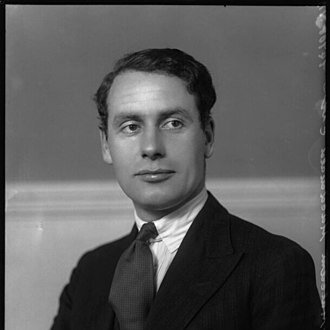Malcolm MacDonald

Malcolm John MacDonald (17 August 1901, Lossiemouth, Scotland – 11 January 1981, Maidstone, Kent, England) was a British politician and “unconventional” diplomat, an ornithologist and art collector (Chinese ceramics, in particular), a promoter of ‘cultural decolonisation’ who published in 1958 what is considered as one of the first English-language, extensively photographed Guide of Angkor.
In 1938, as he was a member (Labour) of the Chamberlain cabinet, his report on Palestine, so-called the MacDonald White Paper, was criticized as it recommended the halt of Jewish immigration to Palestine at a time when Nazi antisemitic persecutions were raging. Later on, MacDonald was appointed High Commissioner to Canada and, after retiring from politics, Governor-General of British territories in Southeast Asia from 1946 to 1948, and then Commissioner-General for Southeast Asia covering regional affairs. He served as Chancellor of the University of Malaya from 1949 to 1961, and as High Commissioner to India from 1955 to 1960. He served as co-chairman of the Laos Conference from 1961 to 1962, and finally as Governor-General of Kenya between 1963 and 1964.
On 16 April 1955, in a classified secret cable, Malcom McDonald wrote to the Office of the Commissioner General for the United Kingdom in South East Asia [National Archives of Australia NAA: A1 838, 3016/1 1/147 PART 1]:
I have the honour to report that His Royal HighnessPrince Sihanouk Norodom of Cambodia stayed with me last night, on his way to the Bandoeng Conference. As soon as we were alone he said that he wished to assure me
that his abdication did not mean that he would leave public life. He would remain in Cambodia and concern himself earnestly with the well-being of the people and the nation. I asked whether his abdication had been a sudden decision or a long-considered plan. He said that he had contemplated it for a long time. As King he could give leadership to his people in certain affairs, but in other matters his activities were necessarily restricted. In the sphere of international relations, for example , he had been able to gain independence
for his country, but now the situation was different and other domestic problems arose, such as social reform and the elimination of corruption, in which he could not play a full part whilst he sat on the throne. One reason for this was that the poople suspected his motives in internal affairs so long as he occupied the throne. They thought that he was selfishly trying to bolster his power as King. He was also associated in their minds with “the corrupt Royal administration”. One motive for his abdication had therefore been that he wished to prove to his people that he was working sincerely for them. He would tell them that as a Prince he had everything he needed, and that he could work unselfishly for their welfare. He said that the elections would be held in September. Whereas eight or nine different political parties had existed previously only three rival organisations would go to the polls — the Democrats on the left, the Liberals on the right, and the “Community” in the centre (the Popular Socialist community ‑a nation-wide organisation craated by the ex-King and which claims
500,000 adherents.) The latter was not a political party, but a rallying of elements from all the parties. Even a number of Democrats were joining. Cambodia needed less party politics and more national unity than it had enjoyed in recent years. The “Community’s” policy would be constitutional, social and administrative reform. It would advccate the Constitution which he had proposed before his abdication. He thought that the Community [Sangkum] would win the elections. The Liberals would get little support; they favoured maintaining ancient
institutions like the monarchy and the royal court unchanged, had no social policy, and were regarded as out of date. The Democrats on the other hand belonged to the fairly extreme Left, and favoured the abolition of ancient institutions. They had lost strength recently. Son Ngoc Thanh was criticised for staying in the forest and doing nothing but talking. The people wanted deeds. That was one reason why they had confided in
him, because he had achieved things. I asked whether he would be the leader of the “Community”. He replied that he would not, since he must not associate himself too closely with any particular political organisation. He must remain above party politics, trying to create the maximum possible national unity. He would not stand for election, nor become the leader of the new movement, but he had agreed to act as its “Counsellor”.
Prince Sihanouk said that he hoped that I would stay with him at Siem Reap during my forthcoming visit to Cambodia. That would give us an opportunity for further private talks in an informal atmosphere. And he would like to conduct me through the Angkor ruins. He asked me whether I liked water-skiing. I replied that I had never done it, but that I had a passion for skiing on snow. He said that he would take me water-skiing on the West Baray at Angkor. That will make the ancient Khmer kings turn in their graves.
His collection of some 500 ancient Chinese ceramics is today split between the Oriental Museum of Durham University, the University of Malaya Museum of Asian Art in Kuala Lumpur and the National University of Singapore Museum in Singapore.
The Durham University Library holds most of MacDonald’s correspondence (including letters to and from HM King Norodom Sihanouk) and personal papers.
In 2018, the Durham University Museum published his essay (Alexander Nicholas Shaw ed.), The Pleasures and Pains of Collecting, in which he wrote: ‘I like Beauty, I love Beauty, I worship Beauty in all its earthly forms’.
- Related Books
